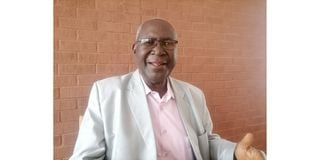Kibaki rescued me from exile, reveals Luhya elders’ chairman

Luhya Council of Elders chairman Patrick Wangamati.
What you need to know:
- Mr Wangamati is the father to Bungoma Governor Wycliffe Wangamati.
- The former MP and other politicians from Western Kenya formed the dreaded February Eighteenth Revolutionary Movement, whose military wing was called the February Eighteenth Revolutionary Army (Fera).
Luhya Council of Elders chairman Patrick Wangamati has narrated how former President Mwai Kibaki rescued him from exile.
While eulogising the late President as a selfless leader who fought for the country's democracy and second liberation, Mr Wangamati, a former Ford Kenya nominated MP, said Kibaki was his personal friend who saved him when he was in exile in Uganda during the Daniel arap Moi regime.
Speaking to the Nation in Bungoma town, Mr Wangamati, the father of Bungoma Governor Wycliffe Wangamati, said Kibaki played a key role in brokering peace between him and Moi that saw him return to Kenya after 20 years in exile.
He had been forced into exile in Uganda after he and other politicians opposed Moi's single-party regime in 1992.
Mr Wangamati and other politicians from Western Kenya had formed the dreaded February Eighteenth Revolutionary Movement, whose military wing was called the February Eighteenth Revolutionary Army (Fera). Its forces were trained in parts of Mt Elgon and eastern Uganda to oppose Moi's dictatorship.
"I recall Kibaki was the one who spoke to Moi and convinced him to allow me back to the country after I had spent many years in Uganda and Rwanda,” Mr Wangamati said.

Luhya Council of Elders chairman Patrick Wangamati speaking to journalists at his Khachonge home in Kabuchai constituency.
The former MP claimed a furious Moi had wanted him dead for destabilising his government.
“There were a lot of tribal clashes in the country in the early 1990s and when I asked Moi to take charge and end them, he (kicked) me out of the country. But when Kibaki was appointed minister for Finance, he convinced Moi to allow me back,” he recalled.
"When we were fighting for the country's second liberation, we had lots of tribal clashes across the country, and I asked Moi, ‘Why is this happening and you as the President have to be answerable because people are dying’. There and then, Moi became [angry with] me and drove me out of the country."
While in exile, he said, he made many friends, and at one time he was called by the United Nations and asked to explain the ills of Moi’s government.
Mr Wangamati said that they told the UN to stop funding Moi’s regime.
He said Kibaki was instrumental in stabilising Kanu as the only strong ruling political party at the time.
"I knew Kibaki when he was the executive officer of Kanu, who laid down strong structures in those days", he said.
Kibaki, he added, was a good scholar who, after being appointed Finance minister, revamped Kenya's ailing economy.
He said the Luhya community was mourning a leader who helped bring development to the region.
"Most industries in this region were started by Kibaki, so we have lost a great leader,” he said.
He said Kibaki ensured that factories like Webuye Pan Paper Mills, Mumias and Nzoia Sugar that were on their deathbeds were revived so as to stabilise the region’s economy.
He urged residents and political leaders to maintain peace and emulate Kibaki's leadership ahead of the August polls.





